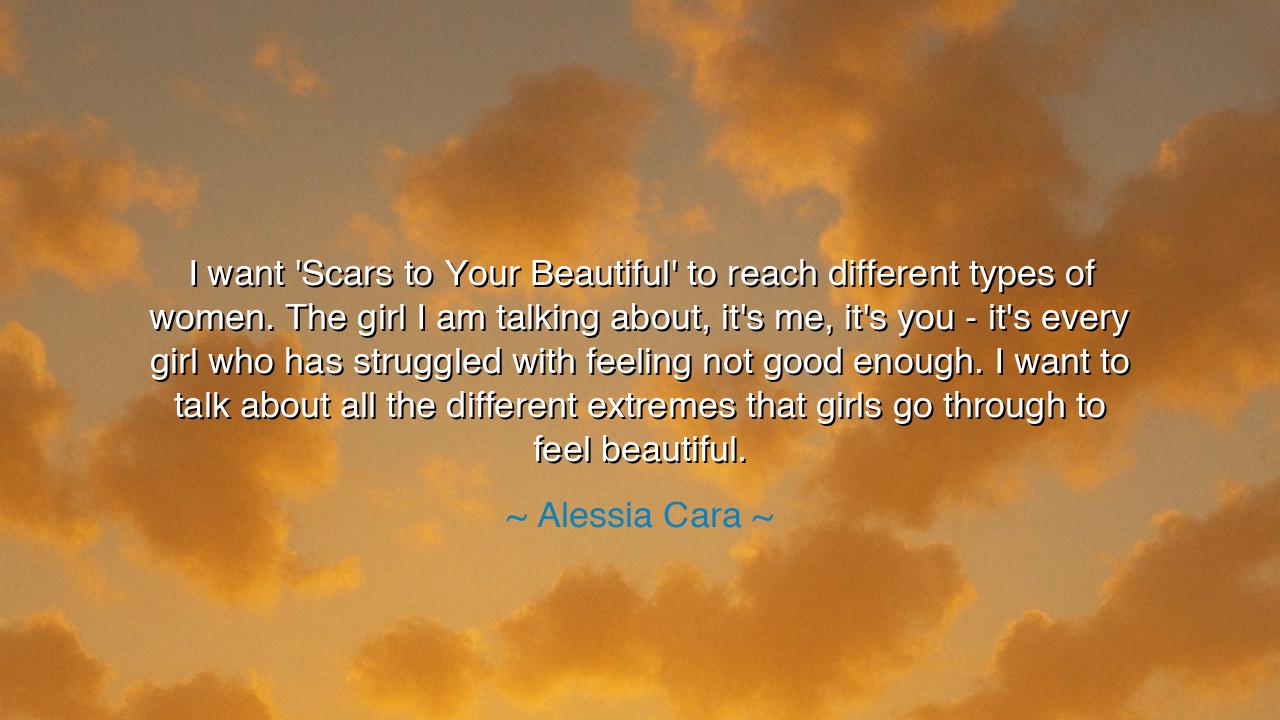
I want 'Scars to Your Beautiful' to reach different types of
I want 'Scars to Your Beautiful' to reach different types of women. The girl I am talking about, it's me, it's you - it's every girl who has struggled with feeling not good enough. I want to talk about all the different extremes that girls go through to feel beautiful.






Hear, O daughters of light and struggle, the words of Alessia Cara, who lifted her voice not only in melody but in truth: “I want Scars to Your Beautiful to reach different types of women. The girl I am talking about, it's me, it's you – it's every girl who has struggled with feeling not good enough. I want to talk about all the different extremes that girls go through to feel beautiful.” In this declaration lies a hymn for every woman who has ever gazed into the mirror and doubted her own worth.
For in a world that binds women with impossible standards, beauty has too often been defined not as it is, but as others demand it to be. Cara calls out the pain of those who starve themselves, hide their scars, or bury their natural selves in the chase for acceptance. Her song is no mere melody; it is a shield, a reminder that worth is not granted by society’s gaze, but flows eternally from within.
The phrase “Scars to Your Beautiful” itself transforms wounds into emblems of strength. Scars—marks of survival, of battles endured—become not flaws but testimonies. Cara proclaims that beauty is not in perfection, but in resilience, in the courage to bear marks of struggle and still stand radiant. In this, she continues the ancient tradition of women who redefined beauty not as compliance, but as power.
History mirrors her words. Consider Frida Kahlo, who suffered great physical pain and bore scars both visible and hidden. Yet she painted herself with fierce honesty, unafraid to reveal the marks of suffering upon her body and soul. Through her art, she declared herself beautiful in her truth, not in conformity. Just so, Cara’s anthem teaches women of every age that they need not erase themselves to be worthy.
Therefore, let this wisdom endure: every woman, in every form, carries beauty that no standard can diminish. Scars are not shame but survival; the struggle against “not enough” is the common battle of women through centuries. Alessia Cara’s words shine as a torch, reminding us that the truest revolution is self-acceptance, and that when women claim their own beauty, they rise not only for themselves, but for all who come after them.






HLDuc Huy Luong
In 'Scars to Your Beautiful,' Alessia Cara beautifully touches on a critical issue — how many women struggle with self-image and the desire to feel beautiful. Her emphasis on different experiences that girls go through makes it relatable for everyone. But in a world still heavily influenced by social media and external opinions, do you think we’re doing enough to change the narrative about beauty, or is more work needed to truly embrace all types of beauty?
KHkhai ho
Alessia Cara’s quote speaks to the universal experience many women have with feeling ‘not good enough’ and the lengths they go to for external validation. It’s so empowering to hear her express the importance of embracing all aspects of our unique beauty. How do you think her music influences the younger generation of women in terms of self-worth? Is it enough for artists to promote self-love, or do we need broader societal change?
NSNguyen Sang
Alessia Cara's intention to reach different types of women and address the extremes they go through to feel beautiful is a refreshing and important message. Many girls and women face struggles related to body image, and Cara’s honesty helps them feel heard. Do you think there’s a shift happening in society where more artists are using their platforms to address issues like self-acceptance and mental health in an authentic way?
NLTran Ngoc Linh
Alessia Cara's message in 'Scars to Your Beautiful' resonates with so many women who have struggled with self-esteem and the pressures to meet certain beauty standards. It’s so powerful that she’s speaking directly to those who feel ‘not good enough.’ How do you think songs like this, which highlight vulnerability and self-acceptance, can help shift the narrative around beauty and self-worth in today’s world?